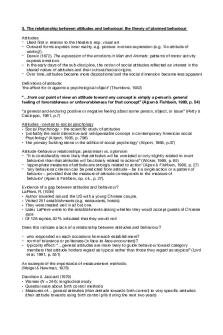2nd lecture - Attitudes Towards the Past PDF

| Title | 2nd lecture - Attitudes Towards the Past |
|---|---|
| Author | Samuel Kelly |
| Course | Archaeology- History of Archaeological Thought |
| Institution | University of Central Lancashire |
| Pages | 3 |
| File Size | 77.1 KB |
| File Type | |
| Total Downloads | 66 |
| Total Views | 147 |
Summary
Attitudes Towards the Past ...
Description
History of archaeological thought Ancient attitudes to the past - The past in the past - The past in the classical period - The past in the medieval period Key Themes: - People have always encountered the past - May have interpreted in a different way
The past in the past stone monuments in Neolithic in Brittany Menhirs 5000 BC - People started to take chunks out of this moment and have been placed in other monuments or incorporated into them. Gavrinis has gone into another tomb. People chose to reuse monuments or old things in the past. West kennet- neolithic. Constructed around 3650 BC Reused in the late neolithic (2800 BC) - New deposits added and the monument had been remodeled. Richard bradley (The past in prehistoric societies)- Book Tara, Ireland- Series of neolithic sites Where the king of ireland was based, also more earlier sies incorporated into this. Maes Howe- neolithic site. Norseman in Maeshowe, broke into here for shelter. History and Prehistory Prehistory is a time of no written proof , e.g up to the roman period. Most of europe and the world : no writing Prehistory Writing from up to 3000 BC - Access to these written sources The Past: Ancient Greeks - Interested in the cultures to the east - Egyptians - Assyrians and persians
Herodotus (historian) (484-425 BC) He wrote the history of babylon used up to the 19th century- good description. Thucydides- Another historian Mycenaean tomb reuse from the bronze ages reused then by the ancient greeks. The past: Babylonians Cuneiform inscriptions- Tells of something going on in the 6th century BC Speaks of Nebuchadnezzar's palace collecting artefacts. This was proved when his dated palace was excavated. The past: Romans Pausanias- Wrote a Travel guide to Greece. Augustus- Visited tomb of alexander the great. Strabo- Corinth- Artifacts eventually become collectable artefacts. Large cycle, Powerful individuals want to collect artefacts from earlier civilizations. The past: Ancient civilisations-Also interested in their own past -Collections of artefacts -Buildings visited -Occasional excavations -Legitimization of present The past in the medieval period-Different to preceding periods -World in decline -End of the world was near -Low levels of literacy -Rural farming RENASSICANCE MARKS BIG CHANGE World understood throught the bible World of recent origin World created 4004 BC (23rd October) People were interested in the search for remains of religious figures. Objects that were found were interpreted as holy relics.
Sites are usually plundered ,They were after mateiral culture and also interested in coins and metalwork. King of sweden apparntley finding a large haord of coins. App...
Similar Free PDFs

Attitudes towards Imperialism
- 2 Pages

Attitudes
- 2 Pages

The ABC model of Attitudes
- 8 Pages

Past the shallows Quotes
- 5 Pages

Rethinking the Past
- 365 Pages

Implicit Attitudes
- 4 Pages

Past the Shallows essay
- 3 Pages

Social Attitudes
- 10 Pages

AMS 1A Lecture 2nd Half
- 22 Pages

Towards A Cashless Society
- 15 Pages

2.4 Past the Shallows notes
- 18 Pages
Popular Institutions
- Tinajero National High School - Annex
- Politeknik Caltex Riau
- Yokohama City University
- SGT University
- University of Al-Qadisiyah
- Divine Word College of Vigan
- Techniek College Rotterdam
- Universidade de Santiago
- Universiti Teknologi MARA Cawangan Johor Kampus Pasir Gudang
- Poltekkes Kemenkes Yogyakarta
- Baguio City National High School
- Colegio san marcos
- preparatoria uno
- Centro de Bachillerato Tecnológico Industrial y de Servicios No. 107
- Dalian Maritime University
- Quang Trung Secondary School
- Colegio Tecnológico en Informática
- Corporación Regional de Educación Superior
- Grupo CEDVA
- Dar Al Uloom University
- Centro de Estudios Preuniversitarios de la Universidad Nacional de Ingeniería
- 上智大学
- Aakash International School, Nuna Majara
- San Felipe Neri Catholic School
- Kang Chiao International School - New Taipei City
- Misamis Occidental National High School
- Institución Educativa Escuela Normal Juan Ladrilleros
- Kolehiyo ng Pantukan
- Batanes State College
- Instituto Continental
- Sekolah Menengah Kejuruan Kesehatan Kaltara (Tarakan)
- Colegio de La Inmaculada Concepcion - Cebu




